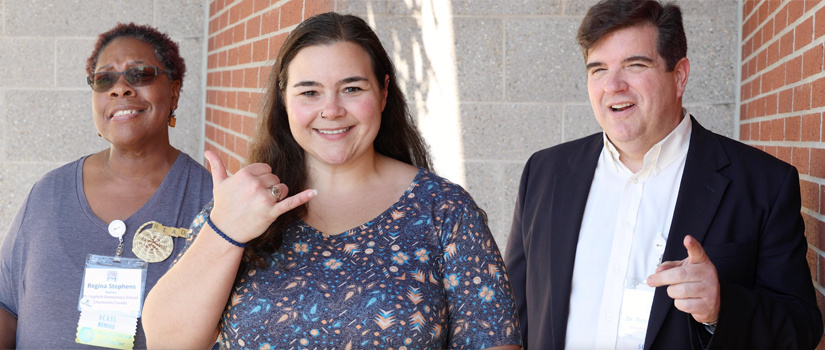Directions and applications can be found on the Graduate School website.
Application deadline: Nov. 1 for spring semester and April 1 for summer and fall.
All required courses for the Master’s program and school library certification are offered fully online.
This means that all courses can be taken by students across the country (and abroad) and that requirements can be completed according to individual schedules.
Our courses are also asynchronous, which means live lecture attendance Is not mandatory and all course lectures and presentations are recorded.
For students who are already certified teachers, you will take 36 hours of coursework which includes one internship.
For students who are not certified teachers, you will take 36 hours of coursework as well as 15 additional hours of coursework in education, which includes a second internship.
The 36 hours include 12 courses: 10 core courses and 2 electives. Information about specific courses offered as well as a suggested order and progression for taking our courses, can be found here.
Depending on how many courses you take each semester and in the summer, time in the program can vary. The maximum number of courses allowed is four per semester without special approval. Most of our students who work part- or full-time can only manage one or two courses per semester, plus courses in the summer sessions. Typically, students who work part or full-time need 2.5 – 3 years to complete the MLIS with school library certification, but it can take longer. Some financial programs specify the number of courses to be taken in a semester. Students are responsible for checking the requirements for loans they are awarded.
The capstone experience includes a final class in school library program development, as well as an internship and a portfolio based on all coursework.
After completing the school library program, candidates will be proficient in the four domains below, as outlined in the ALA/AASL/CAEP School Librarian Preparation Standards (2019) and the SC ADEPT Support and Evaluation Guidelines for School Librarians (2021) :
- Instruction: Candidates will be prepared to work with teachers and other members of the school community.
- Environment: Candidates will be prepared to administer and manage the library program.
- Library Services and Management: Candidates will be prepared to manage and provide access to library resources in and beyond the physical walls of the library to the entire school community.
- Professionalism: Candidates will be prepared to keep up-to-date in the profession and to be leaders in their schools.
View and download a pdf of the entire Learning Outcomes document»
School library students have the option of completing a Certificate in Equity, Diversity, and Inclusion within their coursework. This 12-hour specialization of the graduate certificate in Specialized Study in Information Science develops a deeper understanding of race and ethnicity, gender identity and expression, social class and poverty, and other sociocultural topics through the lens of information science. The goal is for students to be better equipped at recognizing the need for systemic changes in the workplace and to cultivate stronger support and better representation for the populations they will serve in libraries, archives, schools, and across information management fields.
The graduate certificate in Equity, Diversity, and Inclusion requires 12 credit hours (4 courses) and may be completed concurrently with the MLIS. Students who complete the certificate concurrently with the MLIS may share all 4 courses between the certificate and the MLIS.
Jenna Spiering, Assistant Professor
Valerie Byrd Fort, Instructor
Shana Watson, Adjunct Instructor
Heather Thore, Adjunct Instructor
Jennifer Thrift, Adjunct Instructor
School Library Doctoral Students:
Once you complete all graduation requirements and receive a qualifying PRAXIS score (at least 154) you will be eligible to apply for certification by the S.C. Department of Education.
South Carolina licensure is transferable to 48 states. Students who plan to teach in other states should check certification requirements and talk to their faculty advisor.
Questions about certification? Contact Lauren Sanborn
Lauren Brown Sanborn, Ed.S
Undergraduate Academic Advisor and Licensure Administrator
College of Education – Office of Student Services
University of South Carolina
Email: brownlw@mailbox.sc.edu
Phone: (803) 777-6732
Fax: (803) 777-3068
If you’re currently certified as a teacher, you will need one internship in a school library.
If you’re not a certified teacher, you’ll need two internships, one in an elementary school and one in a secondary school (grades 6-12).
Previous work in a library does not count as an internship.
See this graphic for a breakdown of the School Library Practicum Hours Checklist.
Details regarding the internship requirements will be provided as students advance through the program. If you are an initial certification student you will go through a SLED background check in the semester before your internship. All students will also submit a TB test prior to the internship semester.
Additional frequently asked questions and answers can be found here on our FAQ page. Please read through this page carefully before contacting the school for more information.
Questions about application process, tuition, and financial aid?
Contact Jasmine Blackwell
Questions about coursework or being a school librarian?
Contact Jenna Spiering
Questions about program requirements and being a student in the iSchool? Contact Ava Ayers
